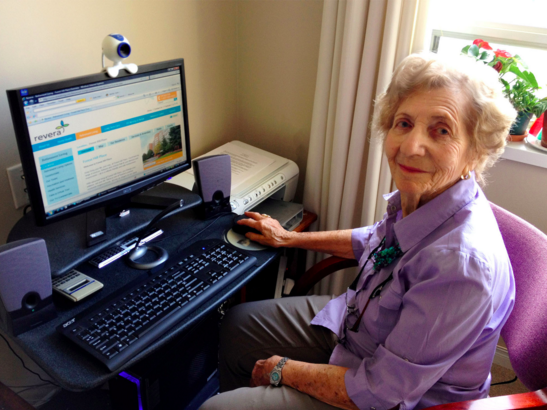January 27, 2018
 Author lancaster
Author lancaster
One of the latest trends in senior living is the advancement of technologies that connect residents to their families and caregivers. Many of these technologies are in the form of mobile apps. Many of these apps offer functionality beyond connecting residents with important people in their lives. Below is a list of our favorite senior apps and the functions offered. Tell My Gio is an android only application, offered for $9.95 per month. This app allows any provider, such as EMT responders, to view medical records of the senior in distress as well as whom to contact in case of emergency. Another function of this app is a GPS locator, which will track the location of the senior in case there is ever confusionRead More +
November 9, 2017
 Author lancaster
Author lancaster
November is Diabetes awareness month, the American Diabetes Association reports that nearly 30 million children and adults in the United States have diabetes. Further, another 86 million have prediabetes and are at risk for developing type 2 diabetes. The American Diabetes Association estimates that the total national cost of diagnosed diabetes in the United States is $245 billion. There are three types of diabetes: Type 1, Type 2, and Gestational. Type 1 Diabetes, previously known as juvenile diabetes, is usually diagnosed in children and young adults and effect 5% of the population. For people with Type 1 Diabetes, the body does not produce insulin. Insulin is a hormone that the body needs to get glucose (simple sugar) from the bloodstream into the cells of theRead More +
November 3, 2017
 Author lancaster
Author lancaster
As the group known as the baby boomers ages and the group over 65 years of age continues to grow, another group is growing in numbers; that is their caregivers. A caregiver can be defined as an unpaid spouse, partner, family member or friend who provides another with assistance with activities of daily living (bathing, dressing, toileting and feeding), medical support (to and from the doctor offices, sorting medications, monitoring glucose levels, etc.), transportation and housekeeping. A formal caregiver is an individual who is paid to provide care either in the client’s home or in a healthcare setting like a nursing home or assisted living community. According to a November 2012 Census, 43.5 million of adult family caregivers care for someone 50 plus years ofRead More +
October 13, 2017
 Author lancaster
Author lancaster
As we get older, our immune system tends to lose strength; this puts the elderly at risk for certain diseases. The elderly can take steps however, to reduce their chances of getting and spreading serious diseases that could result in poor health. An estimated 1 million Americans get shingles every year; about half of these are people over 60. Further, 60% of seasonal flu hospitalizations occur in people over 65 years of age. Getting vaccines can help seniors reduce their chances of getting serious diseases; the recommended vaccines for the elderly include: Seasonal Flu Vaccine – This vaccine protects against the virus that causes respiratory illness. People with allergies to the vaccine or any ingredient in the vaccine (egg, gelatin, antibiotics) Pneumococcal – ARead More +
October 7, 2017
 Author lancaster
Author lancaster
We have all started and failed at diets. Usually we fail because we have failed to plan. We usually start diets based upon something someone else has told us about a new “fad” diet. It generally starts with one of the following statements: You should see so and so, they just lost a ton of weight doing the vinegar (not real) diet I just lost 10 lbs on the Jenny Craig diet, it’s fabulous Everyone I know has started losing weight without even trying by cutting out all carbs etc. etc. Sometimes what makes us panic and start dieting without planning is an event. The wedding of a child where you will see friends and relatives that you haven’t seen since you were 20lbs lighter,Read More +
September 24, 2015
 Author lancaster
Author lancaster
According to the Center for Disease Control and Prevention (CDC) 82% of American Adults take at least one medication; 29% take five or more. Further, 700,000 emergency department visits and 120,000 hospitalizations are due to adverse drug events (ADEs). The number of adverse drug interactions is likely to grow due, in part, to aging/elderly adults. Older adults are twice as likely as their younger counterparts to come to the emergency department for ADEs (over 177,000 a year) and seven times more likely to be hospitalized. There are six reasons why the elderly are more likely to make medication errors: Vision Problems – The elderly may not be able to read the small print; ask your pharmacists for large print. Memory Loss – ThoseRead More +
September 18, 2015
 Author lancaster
Author lancaster
“Where are my keys?” “Has anyone seen my glasses?” As we age, many of us can be heard muttering these questions. The question that many of us wonder, but no out loud, is “Is it Alzheimer’s?” Lapses in memory or difficulty concentrating and remaining focused may lead an individual to ask, “Is this normal or do I have Alzheimer’s disease?” Alzheimer’s disease is a type of dementia that is a progressive and degenerative; it affects memory, thinking and behavior; it is not a normal part of aging. The ability to remember recently learned information, important dates and events, while relying on others to fill in the blanks, can be very disruptive for those with Alzheimer’s disease. For those who are aging normally, forgetfulness, at times,Read More +
September 1, 2015
 Author lancaster
Author lancaster
Decisions, Decisions, Decisions… What to wear, what movie to see, where to go on vacation; making decisions can be tedious and exhausting. Choices, however, become important when you are no longer able to make them due to illness and/or care giving circumstances. Very often, patients, whether voluntary or not, loose the ability to make even the most basic choices; like when to eat or bathe. Choice and control are key factors for maintaining dignity. When looking for care or providing care for a loved one, be sure to know and understand the patient as an individual and ensure their ability to make decisions for themselves. A patient who has played a role in deciding where to receive care, for example, will more likely have aRead More +
August 24, 2015
 Author lancaster
Author lancaster
You (or your appointed power of attorney) have the right to be included in your healthcare decisions. Plain and simple; if you have had a recent hospital stay doctors, nurses, social workers, physical and occupational therapists and a host of other health care disciplines will give input as to where you should go after discharge. Whether you go home with care from family or friends, or with paid home care services or to a skilled nursing facility is a decision you can help to make. If you have had a recent hospital stay due to joint replacement surgery, a recent heart attack or stroke, you will, most likely, need continued care after your hospital stay to ensure your safety at home. Physical and occupational therapyRead More +
August 18, 2015
 Author lancaster
Author lancaster
Recovery after joint replacement surgery, of course, involves physical therapy; but what role does nutrition play in the process? As it turns out, nutrition is plays a key role in a speedy recovery. Implementing some easy nutrition tips may make you feel more comfortable as you recuperate. After surgery your body needs rest and you may not feel like eating. Try to eat smaller meals more frequently so that you are giving your body what it needs to heal. Be sure that you are drinking plenty of water; many symptoms like fatigue, lightheadedness and nausea may be a result of dehydration. Get plenty of fiber, if available, fresh fruits and vegetables will stimulate bowel function which can be slowed after surgery. Good sources of fiberRead More +









